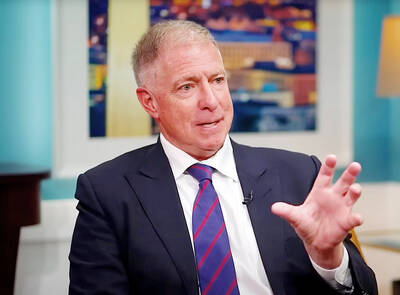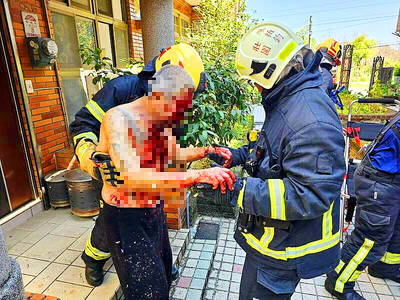There were tears, anger and regret in Geneva on Monday as supporters of Taiwan's attempt to become an observer at the World Health Assembly (WHA) learned that the application had failed for the seventh year in a row.
Before the start of the ass-embly's general committee meeting on Monday morning, members of the Foundation of Medical Professionals Alliance in Taiwan raised banners in the square in front of the assembly venue, appealing for support for Taiwan's bid.
A handful of alliance members carried colorful banners that criticized in different languages the World Health Organization's (WHO) isolation of Taiwan during the worldwide SARS outbreak.
Among the banner-holders were Presidential Advisor Wu Shuh-min (
"WHO isolates Taiwan?" read the English banner. The group, led by Lin Shih-chia (
Their voices were loud, but the appeal was ignored. A few hours later, the WHA general committee kicked out the proposal to include Taiwan's application to be a WHA observer in the assembly agenda.
Lin and his team of supporters were not surprised. To quash Taiwan's efforts, Wu Yi (吳儀), China's vice premier and minister of health, led China's delegation to Geneva and spoke out against Taiwan in the WHA general committee.
Realizing that the application had failed, Lin's voice, which had been chanting slogans all morning, wavered and finally cracked. She stopped, hugged a colleague and cried.
"I am thinking about those who have died of SARS in Taiwan," she sobbed.
After the general committee, Lin said that one of her friends spotted Wu Yi about to leave the building where the meeting took place.
Keen to present the Chinese official with one of the group's green T-shirts with the words "Say Yes to Taiwan" printed on the back, the friend moved toward Wu but was immediately stopped by assembly security guards. Standing nearby wearing their own green T-shirts were Lin and Chary Hsu (許佳惠), a Taiwanese reporter.
The security guards ordered Lin and Hsu to take off their T-shirts. Lin did so, but Hsu hesitated because she had nothing on underneath apart from her underwear.
"About five or six security guards surrounded me, all staring at me as I took off the T-shirt," Hsu said.
When Hsu took off her T-shirt, Lin's friend quickly covered her with his coat.
"I felt harassed," Hsu said.
The security guards took a note of their passports and allowed them to go.
Meanwhile, during the assembly's second plenary meeting that followed the general committee, the observer bid was raised again. China and Pakistan spoke against Taiwan, whereas Senegal and Panama appealed on the country's behalf.
Officials from Taiwan were forced to listen to the debate from the assembly's public gallery.
DPP Legislator Lee Ming-hseng (
Security guards stepped in and ordered Lee to keep his voice down. When Lee protested for the second time, security guards ejected him from the gallery.
"I came to realize how capable Chinese officials are of lying. I was so angry," said Lee, who is attending the WHA for the first time.
Lee said he and other lawmakers encountered Chinese officials as they left the meeting.
"I told them they had violated human rights and that they have no right to determine our business," Lee said.
Chen Mao-nan (
Chen and KMT Legislator Sun Kauo-hwa (
"Sun has often been classified as an advocate for Taiwan's unification with China. However, even he was angered by China's behavior," Chen said.
Sun expressed his disappointment with China. "They said that Taiwan's proposal happens year after year just to waste everybody's time. That was pretty cunning," Sun said.
"But the worst thing was that they kept saying they have helped Taiwan," Sun said.
"When traveling back to our government, we have to think about the so-called mutual communication across the Taiwan Strait so that we will not be used as a political tool," he said.
Sun said his blood was boiling as he listened to Wu Yi's speech in the plenary meeting and called the speech "an insult."
"They are a communist regime. What else can you expect from them?" Sun said.

A total lunar eclipse coinciding with the Lantern Festival on March 3 would be Taiwan’s most notable celestial event this year, the Taipei Astronomical Museum said, urging skywatchers not to miss it. There would be four eclipses worldwide this year — two solar eclipses and two lunar eclipses — the museum’s Web site says. Taiwan would be able to observe one of the lunar eclipses in its entirety on March 3. The eclipse would be visible as the moon rises at 5:50pm, already partly shaded by the Earth’s shadow, the museum said. It would peak at about 7:30pm, when the moon would

DEFENSE: The US should cancel the US visas or green cards of relatives of KMT and TPP lawmakers who have been blocking the budget, Grant Newsham said A retired US Marine Corps officer has suggested canceling the US green cards and visas of relatives of opposition Taiwanese lawmakers who have been stalling the review of a proposed NT$1.25 trillion (US$39.7 billion) special defense budget. The Executive Yuan has proposed the budget for major weapons purchases over eight years, from this year to 2033. However, opposition lawmakers have refused to review the proposal, demanding that President William Lai (賴清德) first appear before the Legislative Yuan to answer questions about the proposed budget. On Thursday last week, 37 bipartisan US lawmakers sent a letter to Legislative Speaker Han Kuo-yu (韓國瑜), the heads

A New York-based NGO has launched a global initiative to rename the nation’s overseas missions, most of which operate under the name "Taipei," to "Taiwan Representative Office (TRO)," according to a news release. Ming Chiang (江明信), CEO of Hello Taiwan, announced the campaign at a news conference in Berlin on Monday, coinciding with the World Forum held from Monday through Wednesday, the institution stated in the release. Speaking at the event, Democratic Progressive Party Legislator Huang Jie (黃捷) said she believed this renaming campaign would enable the international community to see Taiwan

Two siblings in their 70s were injured yesterday when they opened a parcel and it exploded, police in Yilan said, adding the brother and sister were both in stable condition. The two siblings, surnamed Hung (洪), had received the parcel two days earlier but did not open it until yesterday, the first day of the Lunar New Year holiday in Taiwan, police said. Chen Chin-cheng (陳金城), head of the Yilan County Government Police Bureau, said the package bore no postmark or names and was labeled only with the siblings’ address. Citing the findings of a